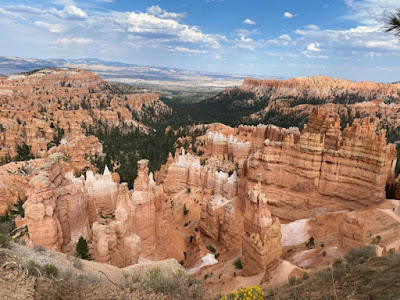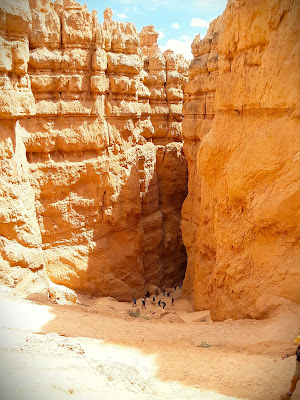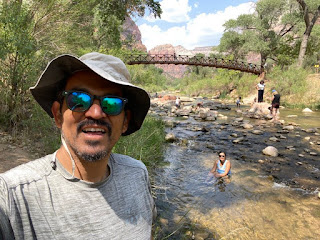Juan Rulfo's World: A Literary Diorama
by Armando Ortiz
Juan Rulfo is one of the best short story writers of the Americas, and his one short novel ranks as one of the best. He stands amongst the great short story writers of all time, and will be read for many years to come.
Rulfo was born in 1917 in Jalisco, Mexico. His father was killed at 6 years old, and four years later his mother died. In his early teens he lived in an orphanage located in Guadalajara. Despite these challenges he managed to study accounting and went on to become an author and salesman. He received a fellowship that enabled him to focus on writing which gave birth to two books.
His stories take place in a time of great instability and violence, The Mexican Revolution (1910-1920) and the Cristero Wars (1926-1929) during which poverty became the environment from which his stories emerge. The violence he describes must have been born from the experiences of that time. Violence, was and still is very common in Latin America stemming from politics. It's a theme that many people around the world can understand.
His whole written canon is made up of two books: a collection of short stories, El Llano En Llamas (The Burning Plain and other short stories) and one short novel, Pedro Paramo. There is another book that was published, a collection of photographs that he took throughout Mexico. I’d heard his name in passing from an acquaintance. He was very familiar with Latin American writers and told me that there was one particular character found in Rulfo’s book of short stories, El Llano En Llamas, that stood out, Lucas Lucatero.
Reading his works one easily gets lost in the web of his prose which creates magical settings inside the mind. His descriptions and emotions blend to become enigmatic of what word play ought to be. His stories set the bar high and are a template for good writing.
In Rulfo’s world people are always coming and going. Going to places unknown and never seen before. Characters come from locations with strange names and sites where prayers go unheard. Protagonists are always passing through towns where the inhabitants seem more like wandering spirits in purgatory. The people in his stories have condemned themselves or have earned the condemnation of others.
Furthermore, the poor travel by foot or donkey, while the rich gallop around in horses. Ghosts, like Sisyphus, are condemned to carry firewood on their backs on paths that lead to nowhere- forever. Horse riders become the embodiment of the pale horse rider found in the Book of Revelation, and are not given the sacred sacraments of priests. Salvation is inches away but never acquired. No one is immune to the sins of humanity, and to the consequences of violence. Heaven has become a mirage that exists only in delirious dreams.
Though not spoken, each character’s perception, hand gesture, physical movements and journeys to certain places indicate their destiny. Fate becomes an individual’s collective decision and collective future. Bandits are shot at night in the midst of a robbery. Murders are swept away by torrential rains or are relegated to haunt towns forever.
Choices that were made at a time of heated passion, anger and depression become part of the condemnation. Death becomes imbued with sentimentality and regret. Revenge almost completes the cycle of justice but the circle is never really closed. Vengeance leaves the door open to more misfortune. Incest brings about hidden desires and outward shows of affection towards the dead through hollow rituals.
Exploitation is a byword for the impunity by which people live. Killers are condemned by their own crimes and their sleep becomes one where ghost talk and victims scream at night. Violence is the accepted norm. Blood, the sacred liquid that is supposed to cleanse, just gets coagulated with dust, dirt and sweat infecting the body. The sick are relegated to sweat it out in their own mental sweat lodge. Clinging on to the hope of going to the bigger town to pray to the holier relic.
Despite the suffering that many characters live through, every one of them wishes to keep on living. Yet when the time comes to confront death everyone tries to run away. Like Antonius Block, the Crusader in Bergman’s The Seventh Seal, they try to play chess against death and make excuses to prolong the game.
Wishing to hold on to life a bit longer, the sweetness of sautéed onions with garlic and olive becomes delectable to them. Morning toil becomes dawn’s morning glory. The gun to their temple makes his characters kneel down and beg for life. Their existence is rough but also bearable in Rulfo’s diorama. Nature in his world takes on dimensions that are linked to ancient Mexican mythology with the recent experienced lives.
Reading through his stories you arrive at small towns where natural forces punish its dwellers, as if the Aztec god of tlaloc slithers around in the background. Streams seem to feed the wild weeds. There is hardly any water that’s drinkable, and irrigating the cornfields is a precarious endeavor. Fruit that is harvested by the shadow characters isn’t sweet. Bitter is the taste of life.
When the rains come, it pours, rivers awaken and can take small adobe homes down canyons and arroyos. The possessions of poverty stricken families; a cow, a pair of pigs and occasionally a relative; are washed away. Life is harsh, but nature seems to be the cruelest of them all.
This harsh natural backdrop becomes a vivid canvas in Rulfo’s narratives. His descriptions of the environment and climate are active and alive, portraying the sun as hot embers hanging over the heads of everyone. When it rains the tears of his characters’ eyes flow as fast as the savage rivers. The sky is blue, and lifeless. Even in the oppressive heat the sky remains cold and silent.
The winds walk down corridors like lost children at the mall, wailing for something. Waking life becomes an itch that has no origins and no cure for it can be found. Sleep becomes torturous, because the weather is uncomfortable and secrets can’t get lost in the darkness. Night quickly disappears and the rising sun quickly wakes everyone up from their slumber.
With the unrelenting heat of the moving sun and the trampling of dirt roads, dust rises. The floating sand particles enter through the mouth and nostrils of the characters making breathing, even for the reader, difficult. Life is tough and complex but his stories are easy to understand.
Even after death spirits wander in the stories in their own hell. Infinity is not something worth talking about or worth discussing because the present moment is too bleak and death so certain. It's just a matter of time before we once again wake up and have to deal with the realities of life. As a result superstition seeps through in many of the religious scenes.
Superstition becomes an outlet of hope where there is none. Saints bleed tears of remorse, because no god exists within Rulfo’s stories. Virgin statuettes seem to shed tears but are artificially placed there by priests in the morning. Idol’s hands spread like branches accepting all, listening to the incoherent cries of believers. Carved dolls cannot see mourners because of the thick incense smoke and their own wooden eyes are blind to injustice. Rulfo, in essence, walks the reader through the Valley of Death and tells them that the journey never ends.
In a way we see the complexity of life through Rulfo eyes. He reveals that humans have complex desires and needs and sometimes are expressed through violence, and superstitions. Yet, a strong sense of human spirit is found in his stories. His characters at times depend on the blessings of priests, blessings that money can and cannot buy. Individuals that have to be forgiven but are not or cannot.
Everyone at some point wants to be forgiven for something they’ve done. Remorse, even in death, is what many spirits continue to carry. Even in the bleakest of scenes you can hear the traces of hope being whispered throughout the stories. Life can be harsh, with violence being relative around the world, and humans always adapting to the changing winds of new ideas versus old traditions. Yet, it's the heat of the day that causes the nectar of flowers to drop like water onto the ground. Experiencing Rulfo’s writing is like entering an entire self contained world where the forces of nature are unforgiving and harsh, and yet people continue to persist in life.




















